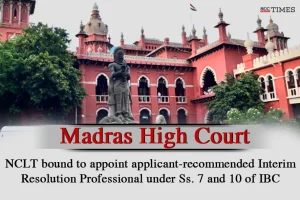Madras High Court: The present petition was filed by the petitioner, an Insolvency Professional, to partially quash the order passed by the National Company Law Tribunal (‘NCLT’) appointing another person as Interim Resolution Professional (‘IRP’) of Annie Traders (P) Ltd. (‘the Company’), terming it arbitrary, violative of Section 16(2) of the Insolvency and Bankruptcy Code, 2016 (‘IB Code’). The Division Bench of Anita Sumanth* and N. Senthilkumar, JJ., while allowing the petition held that the order of the NCLT substituting the IRP proposed by the applicant with an IRP of its own choice, for reasons of its own, could not be sustained. The Court emphasised that for applications under Sections 7 or 10 of the IB Code, the applicant’s recommended professional must be appointed as IRP, unless disciplinary proceedings are pending, leaving no discretion to the NCLT.
Background:
The petitioner was enrolled as a member of the Insolvency Professional Agency of Institute of Cost Accountants of India (‘Agency’), registered as a Resolution Professional (‘RP’) with the Insolvency and Bankruptcy Board of India (‘IBBI’), and held a valid Authorization for Assignment (AFA) issued by the Agency valid till 30-06-2026.
An application under Section 10 of the Insolvency and Bankruptcy Code, 2016 (‘IB Code’) was referred by the Company seeking initiation of Corporate Insolvency Resolution Process (‘CIRP’), where the petitioner was recommended to act as IRP under Section 10(3)(b) of the IB Code. Upon admission, the NCLT appointed another RP instead of the petitioner, which the petitioner found contrary to statutory provisions, particularly Section 16(2) of the IB Code.
The petitioner alleged that it was mandatory for the NCLT to appoint the IRP as recommended by the Financial Creditor (‘FC’) under Section 7 or the Corporate Debtor (‘CD’) under Section 10 of the IB Code and only when an Operational Creditor (‘OC’) was filed under Section 9 could the NCLT deviate from the OC’s proposal.
It was alleged that the competence and eligibility of the professional was beyond question, since the IRP recommendation was made under Sections 7 and 10, and no provision enabled the NCLT to deviate. It was further argued the NCLT had no discretion to override the applicant’s recommendation under Sections 7 and 9 of the Code in appointing an RP of its choice.
Analysis and Decision:
The Court observed that the justification of the NCLT for not accepting the recommendation of the petitioner as IRP was that the Company had changed the recommendation of the IRP multiple times, hence, it thought it fit to appoint an IRP from the IBBI recommended list itself, in the larger interests of the stakeholders. The Court noted that there was no other statutory backing for the NCLT rejecting the recommendation of the Company.
The Court referred to Section 7 of the IB Code, which dealt with initiation of CIRP by an FC, and noted that Section 7(3)(b) of the IB Code made it mandatory for the FC to recommend the name of a resolution professional to act as IRP. The Court pointed out that under Section 7(5) of the IB Code, if the NCLT was satisfied that (i) a default had occurred, (ii) the application was complete, and (iii) no disciplinary proceedings were pending against the proposed RP, it might admit the application or otherwise reject it. The Court further noted that the only circumstance for rejecting the FC’s recommendation was the existence of disciplinary proceedings against the proposed RP.
The Court observed that in an application under Sections 7 or 10 of the IB Code, the professional recommended by the applicant must mandatorily be appointed as the IRP, with the only exception being if disciplinary proceedings are pending against him, leaving no room for the NCLT to take a different view in that regard. The Court emphasised that the apprehension regarding the untrammelled power that this would have vested in the parties, the lack of transparency in appointments, and possible collusion, was assuaged by the availability of robust statutory checks and balances.
The Court also noted that Section 22(2) of the IB Code made it clear that the Committee of Creditors (‘CoC’) might at the very first meeting, and if they had a majority, either resolve to appoint the IRP as RP or to replace the IRP by another RP.
The Court, while allowing the petition, set aside the NCLT’s order that had substituted the IRP proposed by the applicant with one of its own choice, as such substitution could not be sustained. The Court further observed that the NCLT could always record its reservations regarding the proposed IRP. Accordingly, the Court directed the NCLT to pass fresh orders on the application filed by the Company, in accordance with the statutory scheme and the principles of natural justice, within six weeks from the date of receipt of a copy of the order
[K. J. Vinod v. Registrar, National Company Law Tribunal, 2025 SCC OnLine Mad 4840, decided on 13-08-2025]
*Judgment authored by: Justice Anita Sumanth
Advocates who appeared in this case :
For the Petitioner: Varun Srinivasan
For the Respondents: Indumathi Ravi, Guru Dhananjay

